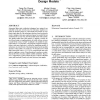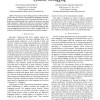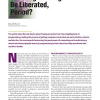107 search results - page 17 / 22 » Formal verification at higher levels of abstraction |
134
click to vote
SIGSOFT
2003
ACM
16 years 2 months ago
2003
ACM
Automated finite-state verification techniques have matured considerably in the past several years, but state-space explosion remains an obstacle to their use. Theoretical lower b...
120
click to vote
ENTCS
2008
15 years 1 months ago
2008
Several recent research efforts have focused on the dynamic aspects of software architectures providing suitable models and techniques for handling the run-time modification of th...
109
click to vote
CHI
2006
ACM
16 years 1 months ago
2006
ACM
icians or philosophers use abstract symbols to derive formulas or form proofs. Indeed, these sketches are structural geometric proofs, consistent with Plato's supposition that...
105
click to vote
DDECS
2007
IEEE
15 years 7 months ago
2007
IEEE
This paper proposes debug patterns combined with an intuitive flow to accelerate and simplify the debugging of SystemC designs. A debug pattern provides a formalized procedure to f...
103
click to vote
COMPUTER
2008
15 years 1 months ago
2008
higher, more appropriate, level of abstraction. It still entails writing programs, usually by using symbols, keywords, and operational instructions to tell the computer what we wan...



